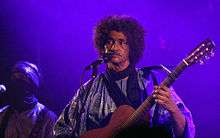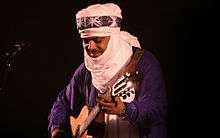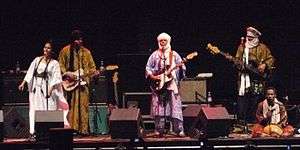Tinariwen
| Tinariwen | |
|---|---|
|
Tinariwen performing in Nuremberg, 2010 | |
| Background information | |
| Origin | Tessalit, Mali |
| Genres | Tishoumaren, world, blues, folk, rock |
| Years active | 1979–present |
| Labels | Independiente, EMMA Productions, Tribal Union, Wayward Records, Outside Music, World Village Records |
| Website | www.tinariwen.com |
Tinariwen (Tamasheq: ⵜⵏⵔⵓⵏ, with vowels ⵜⵉⵏⴰⵔⵉⵓⴻⵏ, pronounced tinariwen "deserts", plural of ténéré "desert"[1]) is a Grammy Award-winning group of Tuareg musicians from the Sahara Desert region of northern Mali. The band was formed in 1979[2] in Tamanrasset, Algeria, but returned to Mali after a cease-fire in the 1990s.[3] The group first started to gain a following outside the Sahara region in 2001 with the release of The Radio Tisdas Sessions, and with performances at Festival au Désert in Mali[4] and the Roskilde Festival in Denmark.[5] Their popularity rose internationally with the release of the critically acclaimed Aman Iman in 2007. NPR calls the group "music's true rebels,"[6] AllMusic deems the group's music "a grassroots voice of rebellion,"[7] and Slate calls the group "rock 'n' roll rebels whose rebellion, for once, wasn't just metaphorical."[8]
Biography
Early years
Tinariwen was founded by Ibrahim Ag Alhabib, who at age four witnessed the execution of his father (a Tuareg rebel) during a 1963 uprising in Mali. As a child he saw a western film in which a cowboy played a guitar. Ag Alhabib built his own guitar out of a tin can, a stick and bicycle brake wire. He started to play old Tuareg and modern Arabic pop tunes. Ag Alhabib first lived in Algeria in refugee camps near Bordj Badji Mokhtar and in the deserts around the southern city of Tamanrasset, where he received a guitar from a local Arab man.[9] Later, he resided with other Tuareg exiles in Libya and Algeria.
In the late 1970s, Ag Alhabib joined with other musicians in the Tuareg rebel community, exploring the radical chaabi protest music of Moroccan groups like Nass El Ghiwane and Jil Jilala; Algerian pop rai; and western rock and pop artists like Elvis Presley, Led Zeppelin, Carlos Santana, Dire Straits, Jimi Hendrix, Boney M, and Bob Marley. Ag Alhabib formed a group with Alhassane Ag Touhami and brothers Inteyeden Ag Ablil and Liya Ag Ablil in Tamanrasset, Algeria to play at parties and weddings.[10] Ag Alhabib acquired his first real acoustic guitar in 1979.[11] While the group had no official name, people began to call them Kel Tinariwen, which in the Tamashek language translates as "The People of the Deserts" or "The Desert Boys."
In 1980, Libyan ruler Muammar al-Gaddafi put out a decree inviting all young Tuareg men who were living illegally in Libya to receive full military training. Gaddafi dreamed of forming a Saharan regiment, made up of the best young Tuareg fighters, to further his territorial ambitions in Chad, Niger, and elsewhere. Ag Alhabib and his bandmates answered the call and received nine months of training. They answered a similar call in 1985, this time by leaders of the Tuareg rebel movement in Libya, and met fellow musicians Keddou Ag Ossade, Mohammed Ag Itlale (aka "Japonais"), Sweiloum, Abouhadid, and Abdallah Ag Alhousseyni. All sang and played guitar in various permutations. The musicians joined together in a collective (now known as Tinariwen) in order to create songs about the issues facing the Tuareg people, built a makeshift studio, and vowed to record music for free for anyone who supplied a blank cassette tape. The resulting homemade cassettes were traded widely throughout the Sahara region.
In 1989, the collective left Libya and moved to Ag Alhabib's home country of Mali, where he returned to his home village of Tessalit for the first time in 26 years. In 1990 the Tuareg people of Mali revolted against the government, with some members of Tinariwen participating as rebel fighters. After a peace agreement known as the Tamanrasset Accords was reached in January 1991, the musicians left the military and devoted themselves to music full-time. In 1992 some of the members of Tinariwen went to Abidjan, Côte d'Ivoire to record a cassette at JBZ studios. They played occasional gigs for far-flung Tuareg communities throughout the Sahara region, gaining word-of-mouth popularity among the Tuareg people.
International recognition (1998–2009)

In 1998, Tinariwen came to the attention of the French world music ensemble Lo'Jo and their manager Philippe Brix. That group traveled to a music festival in Bamako and met two members of the Tinariwen collective. In 1999 some members of Tinariwen traveled to France and performed with Lo'Jo under the name Azawad. The two groups organized the January 2001 Festival au Désert in Essakane, Mali with Tinariwen as the headliners, and in close cooperation with the Belgian Sfinks Festival. The festival brought much outside attention to Tinariwen. By the end of 2001, Tinariwen had performed at WOMAD and Roskilde. Tinariwen gained more attention overseas in 2004, with their first UK performance at the largest free African music festival in the country, Africa Oye. Their debut CD, The Radio Tisdas Sessions, was recorded by Justin Adams and Jean-Paul Romann at the radio station of the same name (the only Tamashek-speaking station in Kidal, Mali) and released in 2001. It was Tinariwen's first recording to be released outside of northern Africa.
Since 2001 Tinariwen have toured regularly in Europe, North America, Japan, and Australia; often appearing at large world music/alternative festivals like Glastonbury, Coachella, Roskilde, Les Vieilles Charrues, WOMAD, FMM Sines, and Printemps de Bourges. Their 2004 album Amassakoul ("The Traveller" in Tamashek) and its 2007 follow-up Aman Iman ("Water Is Life" in Tamashek) were released worldwide and gained the notice of celebrity fans including Carlos Santana, Robert Plant, Bono and the Edge of U2, Thom Yorke of Radiohead, Chris Martin of Coldplay, Henry Rollins, Brian Eno, and TV On The Radio. In 2005 Tinariwen received a BBC Award for World Music, and in 2008 they received Germany’s prestigious Praetorius Music Prize.
Also since 2001, the Tinariwen collective has added several younger Tuareg musicians who did not live through the military conflicts experienced by the older members but have contributed to the collective's multi-generational evolution. New members include bassist Eyadou Ag Leche, percussionist Said Ag Ayad, guitarist Elaga Ag Hamid, guitarist Abdallah Ag Lamida, and vocalists Wonou Walet Sidati and the Walet Oumar sisters. The band's 2009 album Imidiwan (Tamashek for "Companions") was recorded in a mobile studio by Jean-Paul Romann in the village of Tessalit, Mali.
Further international success (2010–present)
In 2010, Tinariwen represented Algeria in the opening ceremony of the 2010 FIFA World Cup in South Africa.[12] They completed 24 performances in the United States of America late in the year.[13]
The band released their fifth album Tassili on August 30, 2011.[14] Tassili included guest appearances by Nels Cline, The Dirty Dozen Brass Band, and Tunde Adebimpe and Kyp Malone of TV on the Radio.[15] The album later won the Award for Best World Music Album at the 54th Grammy Awards.[16] In July 2011 the collective set out for a new world tour that included performances at the End of the Road Festival in September and All Tomorrow's Parties in December.[17] Tinariwen appeared on The Colbert Report on November 29, 2011 with Adebimpe and Malone to play "Tenere Taqqim Tossam" and "Imidiwan Ma Tenam" from Tassili. Group members Ibrahim Ag Alhabib, Alhassane Ag Touhami, and Eyadou Ag Leche participated in a translated interview with Colbert.[18]
In early 2012 there was another Tuareg rebellion in Tinariwen's home region of northern Mali, with the National Movement for the Liberation of Azawad (MNLA) declaring independence and forming the short-lived unrecognized state Azawad. In August 2012, another party in the rebellion, the militant Islamist group Ansar Dine, denounced the presence of popular music in the territory and stated "We do not want Satan's music. In its place will be Quranic verses. Sharia demands this. What God commands must be done."[19] Tinariwen was targeted specifically during this campaign.[20] In a January 2013 confrontation, most band members evaded capture, except Abdallah Ag Lamida who was abducted while trying to save his guitars.[21][22] A few weeks later, Tinariwen reported that Ag Lamida had been released and was "safe and free."[23]
During Ag Lamida's captivity, several other members of Tinariwen fled from the conflict and resettled temporarily in the southwestern United States to record their sixth album, Emmaar, with guests including Josh Klinghoffer, Fats Kaplin, Matt Sweeney, and Saul Williams.[24] Emmaar was released worldwide in February 2014. Tinariwen then embarked on a tour of Europe and North America, but without group leader Ibrahim Ag Alhabib, who decided to remain in Mali to attend to family issues caused by the latest political crisis. Bassist Eyadou Ag Leche assumed the role of musical director, and a new singer/guitarist named Yad Abderrahmane was recruited to perform Ag Alhabib's parts during the tour. Abderrahmane is expected to remain with the group after Ag Alhabib's return.[25]
Musical style
The Tinariwen sound is primarily guitar-driven in the style known as assouf among the Tuareg people. The Tinariwen guitar style has its roots in West African music, specifically that from the "great bend" region along the Niger River, between Timbuktu and Gao. The core elements of Tinariwen's music are traditional Tuareg melodies and rhythms including those played on the shepherd's flute, which is primarily a man's instrument; and those played on a one-string fiddle known as an imzad which is played by women. The primary percussion instrument is the tindé drum which is played by women at festive occasions. Another important traditional influence is the lute known as the teherdent, which is played by the griots of the Gao and Timbuktu regions. In the late 1970s, when the founding members of Tinariwen started playing acoustic guitars, they played a traditional repertoire adapted to the western guitar.
Other regional influences include Berber music from northern Algeria, especially radical Kabyle singers like Ait Menguellet and Ferhat; the pop sounds of electrified rai music of Algeria; pop singers from Algeria like Rabah Driassa;[9] pop groups from Morocco like Nass El Ghiwane and Lemchaheb with their lute and mandol riffs; the classical pop of Egypt; and even Bollywood music. Tinariwen was also influenced by traditional Malian musicians, the most famous of which was Ali Farka Toure. In the early years of the collective's history, the members were also fans of bootlegged albums by western acts that had made their way to the Tuareg people, with favorites including albums by Dire Straits, Santana, Led Zeppelin, Bob Dylan, Jimi Hendrix, Kenny Rogers and Don Williams.
While the Tinariwen style is possibly a distant relative of blues music, via West African music, members of Tinariwen claim to have never heard actual American blues music until they began to travel internationally in 2001.
Band members
Tinariwen has always been a collective of singers, songwriters, and musicians who come together in different combinations to play concerts and to record. This is because of the nomadic lifestyle of the Tuareg people and the difficulties of transportation and communication in the Sahara region. The group has never brought exactly the same line-up on its international tours, though several members tour regularly.[25]
Unfortunately, two influential members of Tinariwen are no longer living - founder Inteyeden Ag Ablil (brother of guitarist Liya Ag Ablil) died of a virus in the desert in 1994, and singer Wonou Walet Oumar (sister of former lead vocalist Mina Walet Oumar; not directly related to another former member, Wonou Walet Sidati) died of a kidney infection in 2005. Both remain with the band in spirit.
Active touring members

- Ibrahim Ag Alhabib - lead guitar, vocals
- Alhassane Ag Touhami - guitar, vocals
- Abdallah Ag Alhousseyni - acoustic guitar, vocals
- Eyadou Ag Leche - bass guitar, acoustic guitar, calabash, vocals, backing vocals
- Said Ag Ayad - percussion, backing vocals
- Elaga Ag Hamid - guitar, backing vocals
- Abdallah Ag Lamida ("Intidao") - guitar, backing vocals
- Mohammed Ag Tahada - percussion
- Yad Abderrahmane - guitar, vocals
Non-touring and previous members
- Inteyeden Ag Ablil (deceased) - guitar, vocals
- Mohammed Ag Itlale (aka "Japonais") - guitar, vocals
- Keddou Ag Ossad - guitar, vocals
- Liya Ag Ablil - rhythm guitar, vocals
- Sweiloum - guitar, vocals
- Foy Foy - guitar, vocals
- Abouhadid - guitar, vocals
- Wonou Walet Sidati - vocals
- Kesa Ag Hamid - vocals
- Mina Walet Oumar - vocals
- Wonou Walet Oumar (deceased) - vocals
Awards
- In 2012 they won Best Group in the Songlines Music Awards [26] for their album Tassili.
- In 2012 they won the Grammy Award for Best World Music Album for their album Tassili.[27]
Discography
- Albums
| Year | Album | Peak positions | Certification | |||||||
|---|---|---|---|---|---|---|---|---|---|---|
| BEL (Vl) [28] |
BEL (Wa) [29] |
FR [30] |
NED [31] |
NOR [32] |
SWE [33] |
SWI [34] |
UK | |||
| 2001 | The Radio Tisdas Sessions | – | – | – | – | – | – | – | – | |
| 2004 | Amassakoul | – | – | 80 | – | – | – | – | – | |
| 2007 | Aman Iman: Water is Life | – | – | 72 | 84 | – | 41 | – | – | |
| 2009 | Imidiwan: Companions | 68 | – | 82 | 81 | – | – | – | – | |
| 2011 | Tassili | 33 | 46 | 95 | – | 15 | – | – | 68 | |
| 2014 | Emmaar | 61 | 115 | 90 | – | – | – | 92 | – | |
- Others
| Year | Album | Peak positions | Film |
|---|---|---|---|
| FR [30] | |||
| 2006 | The Soul Rebel of African Desert | – | Amassakoul & Jérémie Reichenbachs film The Guitars of the Touareg Rebellion (CD / DVD) |
- Contributing artist
- The Rough Guide To Desert Blues (2010)
- The Imagine Project - Herbie Hancock (2010) ("Tamatant Tilay/Exodus" with K'naan and Los Lobos)
References
- ↑ Jeffrey Heath, Dictionnaire touareg du Mali: tamachek-anglais-français (KARTHALA Editions, 2006: ISBN 2-84586-785-9), p. 490; the root is nr.
- ↑ "Saharan musicians win Uncut award". BBC News. 2009-11-09.
- ↑ Pareles, Jon (2002-07-05). "Critic's notebook; A World That Sings Together". The New York Times.
- ↑ Jon Pareles (2010-02-19). "Hot Breath of Saharan Rock Blows in From Africa". The New York Times.
- ↑ Ryan Dombal and Paul Thompson (2010-05-07). "Roskilde 2010". Pitchfork Media.
- ↑ "Tinariwen: Music's True Rebels". National Public Radio. 2007-11-10.
- ↑ Evan C. Gutierrez. "Tinariwen: Biography". AllMusic. Retrieved 8 April 2014.
- ↑ Jody Rosen (31 May 2007). "Enter Sandmen: Is Tinariwen the greatest band on earth?". Slate. Retrieved 8 April 2014.
- 1 2 Morgan, Andy (February 2007). "TINARIWEN – Sons of the desert". Songlines. Retrieved 25 January 2013.
- ↑
- ↑ ,
- ↑ Perry, Alex (June 10, 2010). "World Cup Concert: The Real Rebels of Rock 'n' Roll". Time.com. Retrieved 25 January 2013.
- ↑ "Tinariwen Announce North American Dates". Anti Records. 12 September 2011. Retrieved 1 December 2011.
- ↑ "Tinariwen: New Album, US Tour on JamBase". Jambase.com. Retrieved 2014-02-10.
- ↑ "Tassili". AllMusic. 30 August 2011. Retrieved 7 April 2014.
- ↑ "The Official Site of Music's Biggest Night". GRAMMY.com. Retrieved 2014-02-10.
- ↑ Sean Michaels (2011-06-09). "Tinariwen team up with TV on the Radio members for new album". The Guardian. London. Retrieved 7 July 2011.
- ↑ "Tinariwen Captivate On Colbert Report". Anti Records. 30 November 2011. Archived from the original on January 19, 2012. Retrieved 1 December 2011.
- ↑ Billie Odidi (1 January 2013). "2012: When Mali music came under attack". Retrieved 11 January 2013.
- ↑ Andy Morgan (23 October 2012). "Mali: no rhythm or reason as militants declare war on music". Retrieved 7 April 2014.
- ↑ "Intidaw, le vocaliste Touareg du célèbre groupe Tinariwen, a été arrêté par le groupe terroriste Ansar Dine". Malijet.com. 3 January 2013. Retrieved 11 January 2013.
- ↑ Snow, Jon (17 January 2013). "The band from Mali I hugged in Shepherds Bush". Snowblog. Channel 4 News. Retrieved 5 February 2013.
- ↑ "Tinariwen Official Page". Facebook. 3 January 2013. Retrieved 7 February 2013.
- ↑ "Emmaar". AllMusic. 10 February 2014. Retrieved 7 April 2014.
- 1 2 "ABC Concerts: Tinariwen". Ancienne Beljique. 9 March 2014. Retrieved 7 April 2014.
- ↑ "Music Awards - 2014 - recognising outstanding talent in world music". Songlines. 2014-01-31. Retrieved 2014-02-10.
- ↑ "Past Winners Search". Grammy.com. Retrieved 2014-02-10.
- ↑ "Tinariwen discography". ultratop.be/nl/. Hung Medien. Retrieved 28 February 2014.
- ↑ "Tinariwen discography". ultratop.be/fr/. Hung Medien. Retrieved 28 February 2014.
- 1 2 "Tinariwen discography". lescharts.com. Hung Medien. Retrieved 28 February 2014.
- ↑ "Tinariwen discography". dutchcharts.nl. Hung Medien. Retrieved 28 February 2014.
- ↑ "Tinariwen discography". norwegiancharts.com. Hung Medien. Retrieved 28 February 2014.
- ↑ "Tinariwen discography". swedishcharts.com. Hung Medien. Retrieved 28 February 2014.
- ↑ "Tinariwen discography". hitparade.ch. Hung Medien. Retrieved 28 February 2014.
External links
| Wikimedia Commons has media related to Tinariwen. |
- Official Tinariwen site
- Tinariwen wins 2009 Uncut Music Award for their album "Imidiwan"
- Images of Tinariwen in Mali and UK
- Tinariwen live at Other Music
- Live Review of Tinariwen on the Daily Music Guide
- Article on Tinariwen on music.aol.ca
- Tinariwen - Music of the Tuarek - Desert Blues
- Tinariwen Bio (2011) on the Anti Records website
- Tinariwen: from the Sahara to New York City by their former manager Andy Morgan for The Observer
